Kilimanjaro Facts
Mount Kilimanjaro is far more than Africa's tallest mountain. It's a place where the extraordinary meets the unexpected! As you plan your epic Kilimanjaro Climbing expedition, take a moment to learn some Kilimanjaro Facts that will pique your interest.
Here, we disclose a range of fascinating facts about Kilimanjaro that will leave you marveling at its unique character and global significance. From its accessible non-technical routes to age-defying climbers, the allure of Mount Kilimanjaro Climbing lies not just in its height but in the captivating stories it holds.
Fact 1 – Kilimanjaro Is The World’s Tallest Free-Standing Mountain
Mount Kilimanjaro, located in East Africa, boasts a prominent position in the world of mountains.
- It stands as the highest free-standing mountain globally. This is thanks to its remarkable prominence of 4,900 meters (16,100 feet).
- Unlike most of the world's tallest peaks that are part of extensive mountain ranges, Kilimanjaro stands alone. This Interesting Fact About Mount Kilimanjaro makes it a unique geological feature.
- This isolation, coupled with its impressive prominence, allows Kilimanjaro to be visible from great distances and offers sweeping vistas from its summit on clear days.
An Interesting Comparison – Kilimanjaro's prominence sets it apart from many renowned mountains, including Table Mountain, which has a prominence of just 1,055 meters.
Fact 2 – No One Knows Where The Name Of Kilimanjaro Comes From
Some propose that Kilimanjaro translates to 'mountain of greatness,' while others suggest 'mountain of whiteness' as its possible meaning.
- Yet, despite efforts, concrete evidence for any of these theories remains elusive.
- A Fun Fact About Mount Kilimanjaro, specifically its summit is that it underwent a significant name change in 1964.
- It was previously called the Kaiser Wilhelm Spitze (Peak). The name was given during the era of German East Africa.
The mountain's highest point was renamed Uhuru Peak when Tanzania gained independence. Uhuru, which translates to 'freedom' in Swahili, symbolizes the spirit of this towering summit, reflecting the nation's journey towards freedom.
Fact 3 – Mount Kilimanjaro Is Home To Both People And Wildlife
Another Climbing Mount Kilimanjaro Facts is the presence of communities and wildlife. At the base of Kilimanjaro, the Chagga people, known as Wachagga, have established their homes.
- As the third-largest ethnic group in Tanzania, the Chagga share a profound and historic connection with the mountain.
- Here, each family maintains a home garden or a small farm, cultivating a bounty of crops that include bananas, coffee, and sugarcane.
While Kilimanjaro lacks a bamboo zone, limiting its capacity to support an extensive array of wildlife – It is not lacking of nature's presence. Within its unique ecosystem, several species of animals have adapted and flourished. For instance, below are some examples of the Wildlife on Kilimanjaro:
| WILDLIFE SPECIES |
HABITAT |
| Colobus Monkeys |
Can be found in the forested regions of Kilimanjaro. |
| Mongooses |
Thrive in various habitats, including the montane forests. |
| Honey Badgers |
Often seen in the lower slopes of Kilimanjaro, where they search for food. |
| Bushbuck |
Inhabit the montane forests and grassy clearings on the mountain. |
| White-Necked Ravens |
Frequently observed soaring over various zones of the mountain. |
Kilimanjaro, therefore, stands not only as a geological marvel but also as proof of the cohabitation of human and animal life.

Quest From The West
January – December 2026
African Scenic Safaris
8 Days Climbing
Travel Style
Scenic Trekking, High-Altitude Adventure & Gradual Acclimatisation
Climb Starts
Moshi, Tanzania
Climb Ends
Moshi, Tanzania
Price On Request
Incl Camps & Accommodations

Orbit Kilimanjaro
January – December 2026
African Scenic Safaris
9 Days Climbing
Travel Style
Scenic Wilderness Trek & Ultimate Acclimatisation
Climb Starts
Moshi, Tanzania
Climb Ends
Moshi, Tanzania
Price On Request
Incl Camps & Accommodations

Without The Whiskey
January – December 2026
African Scenic Safaris
7 Days Climbing
Travel Style
Classic Mountain Trek & High-Altitude Adventure
Climb Starts
Moshi, Tanzania
Climb Ends
Moshi, Tanzania
Price On Request
Incl Camps & Accommodations

Above The African Plains
January – December 2026
African Scenic Safaris
7 Days Climbing
Travel Style
Remote Mountain Trek & Scenic Summit Adventure
Climb Starts
Moshi, Tanzania
Climb Ends
Moshi, Tanzania
Price On Request
Incl Camps & Accommodations

10 Days Lemosho Climbs
January – December 2026
African Scenic Safaris
10 Days Sustainable
Travel Style
Scenic Trekking, High-Altitude Adventure
Climb Starts
Moshi, Tanzania
Climb Ends
Moshi, Tanzania
Price On Request
Incl Camps & Accommodations

Machame Climbs
January – December 2026
African Scenic Safaris
9 Days Sustainable
Travel Style
Classic Mountain Trek & High-Altitude Adventure
Climb Starts
Moshi, Tanzania
Climb Ends
Moshi, Tanzania
Price On Request
Incl Camps & Accommodations
01
/ 06
Fact 4 – There Are Five Climatic Zones On Kilimanjaro
Another Mount Kilimanjaro Fun Fact is that it harbours a range of diverse climatic zones within its slopes. During a Mount Kilimanjaro Climbing journey, you'll traverse through distinct ecosystems, each with its own unique character.
- The journey begins in the cultivated zone, where vibrant farms and lush vegetation thrive.
- Beyond lies the enchanting rainforest zone, a place covered in greenery and alive with the sounds of nature.
- Continuing upwards, you'll encounter the desert zone, where the landscape transforms into an otherworldly environment.
- Yet, the most captivating transformation awaits in the Arctic zone, where glaciers and icefields shine in the high-altitude sun.
Finally, the alpine zone crowns the mountain, with its rocky terrain and hardy, high-altitude flora. This extraordinary range of climatic zones is a reflection of the diverse beauty that’s encountered during Climbing Mount Kilimanjaro.
When climbers hike to the top of Kilimanjaro, they are in fact hiking to the highest point along the rim of the Kibo Crater.
Fact 5 – Kilimanjaro Has Three Volcanic Cones
Not everyone knows that Mount Kilimanjaro is a dormant volcano. And even more people are uninformed of the Kilimanjaro Fun Fact that it has three volcanic cones. Below is a representation going over the three volcanic cones of Kilimanjaro. This will make it easier to grab the feature of each one:
| VOLCANIC CONE |
ELEVATION (METERS) |
NOTABLE FEATURES |
| Kibo |
5,895 |
- Highest of the three cones- It houses Uhuru Peak, the highest point in Africa- Features a stunning ice cap |
| Mawenzi |
5,149 |
- The second-highest cone- Known for its rugged and jagged terrain.- Offers challenging climbing Mt Kilimanjaro routes. |
| Shira |
3,962 |
- The oldest of the three cones- Now eroded and mostly submerged in the plateau.- Remarkable for its unique history. |
An Added Fun Insight – When climbers hike to the top of Kilimanjaro, they are in fact hiking to the highest point along the rim of the Kibo Crater.
An Interesting Comparison – Kilimanjaro's prominence sets it apart from many renowned mountains, including Table Mountain, which has a prominence of just 1,055 meters.
Fact 6 – The First Person To Climb Kilimanjaro Was Hans Meyer
One of the most Interesting Facts About Mount Kilimanjaro is that the first successful ascent was accomplished by Hans Meyer. It was done in the year 1887.
One of the major hurdles that Meyer had to face was the lack of food available at the top of Kilimanjaro. He solved this by setting up camps at various points along his chosen route. This included one at:
- Abbot’s Camp – at 3,804 m
- Kibo Camp – at 14,210 m
- And, a small encampment just below the glacier – at 4,578 m
Thanks to these camps, Meyer was able to conduct several attempts to the summit without having to return to the base.
Fact 7 – It Is Possible To Climb Kilimanjaro Without Climbing Gear
A Surprising Fact About Kilimanjaro is that you do not need any special climbing gear or even climbing experience to reach Uhuru Peak. This is due to the fact that Kilimanjaro Climbing expeditions are non-technical.
This means that determined hikers, regardless of their mountaineering background, can take part on the Best Kilimanjaro Tours. It's a demonstration to the mountain's draw that it welcomes adventurers from various walks of life. This makes it an encouragement of possibility in the world of climbing.
Fact 8 – The Youngest And Oldest Person To Climb Kilimanjaro
Age knows no bounds in terms of Facts About Mount Kilimanjaro. This is evidenced by the remarkable climbers who have conquered the peak.
- Jordan Romero's remarkable ascent at the tender age of 10 stands as living proof to youthful determination and adventurous spirit.
- On the flip side, Anne Lorimor's achievement as the oldest person to reach Kilimanjaro's summit at the age of 89 showcases that this mountain is not just for the young.
It's a place where the spirit of exploration knows no age limits, inspiring people young and old to push their limits.
As you reflect on your own epic Mount Kilimanjaro Climbing Quest remember that it stands tall, inviting you to discover the boundless charm that lies within its facts and mysteries.
Fact 9 – Kilimanjaro’s Ice Caps Are Melting
One of the Mount Kilimanjaro Interesting Facts is that its icecap has shrunk 82% since 1912 and is destined to disappear altogether.
- The reason for this is due to the effects of climate change.
- Over the years, they have been receding at an alarming pace, altering the mountain's appearance and raising environmental concerns.
Kilimanjaro's vanishing ice serves as a reminder of the pressing need to address climate issues and protect our planet's natural wonders, highlighting the profound impact of global warming even on the most remote and spectacular landscapes.
Fact 10 – Kilimanjaro’s Success Rate Is Only 50%
Climbing Kilimanjaro is a challenging attempt, and its success rate speaks to the mountain's demanding nature.
- Statistics reveal that approximately 50% of climbers who attempt the ascent successfully reach the summit.
- This percentage underscores the physical and mental capacity required to conquer the mountain.
- The journey is demanding, with varying terrain and altitude challenges, but it's precisely this challenge that makes each successful ascent a remarkable achievement.
Climbers who stand atop Kilimanjaro's Uhuru Peak can take immense pride in overcoming the obstacles that this iconic peak presents.
Revealing the Appeal of Kilimanjaro, One Fact at a Time!
Intriguing and inspirational, the Kilimanjaro Facts offer a glimpse into the heart of this grand mountain. As you consider the remarkable stories merged into its slopes, you may find yourself drawn to its call, ready to take on the challenge that a Mount Kilimanjaro Climbing journey presents.
Explore Kilimanjaro Travel Guide
Find essential topics below to help you plan, prepare, and enjoy your Kilimanjaro travel experience fully.
Climb Kilimanjaro With Us
Get ready for a mountain adventure with real advice, smiling guides, and simple help that actually works. We’re with you from start to summit.
Frequently Asked Questions
The person who climbed Kilimanjaro the fastest is Karl Egloff, an Ecuadorian-Swiss athlete. He set the record on August 13, 2014, completing the climb up and down in just 6 hours, 42 minutes and 24 seconds.
Kilimanjaro Glaciers are estimated to be about 11,700 years old.
Kilimanjaro is approximately 330 kilometers (205 miles) south of the equator.
Eva Stuart-Watt is often credited as the first woman to reach Kilimanjaro's Summit in 1927, although local Chagga women had ascended it before recorded history.
No, the Kilimanjaro Climbing Routes do not demand technical climbing skills, making it accessible to determined hikers.
Kilimanjaro has three volcanic cones: Kibo, Mawenzi, and Shira.
Kilimanjaro features cultivated, rainforest, desert, Arctic, and alpine zones as you ascend during a Mount Kilimanjaro Climbing adventure.
Yes, Kilimanjaro's glaciers are rapidly disappearing due to the effects of climate change.
Simbo Natai, founder of African Scenic Safaris, crafts sustainable, meaningful Tanzanian journeys rooted in his deep local knowledge and passion.
Director









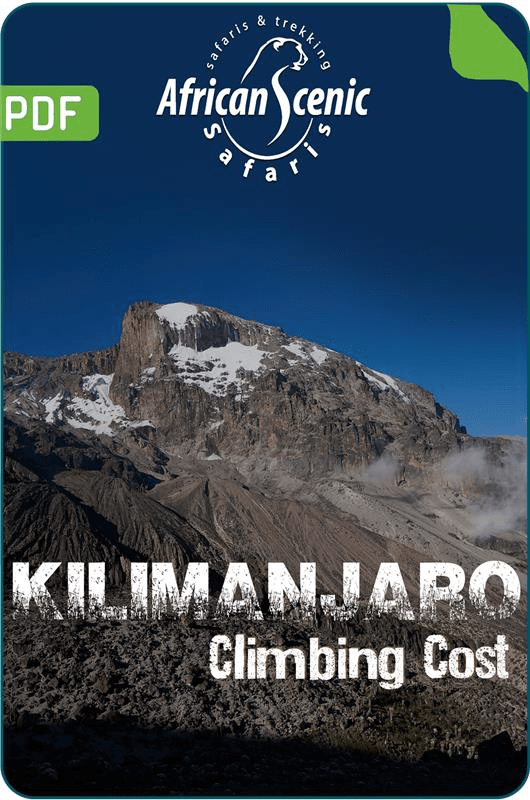





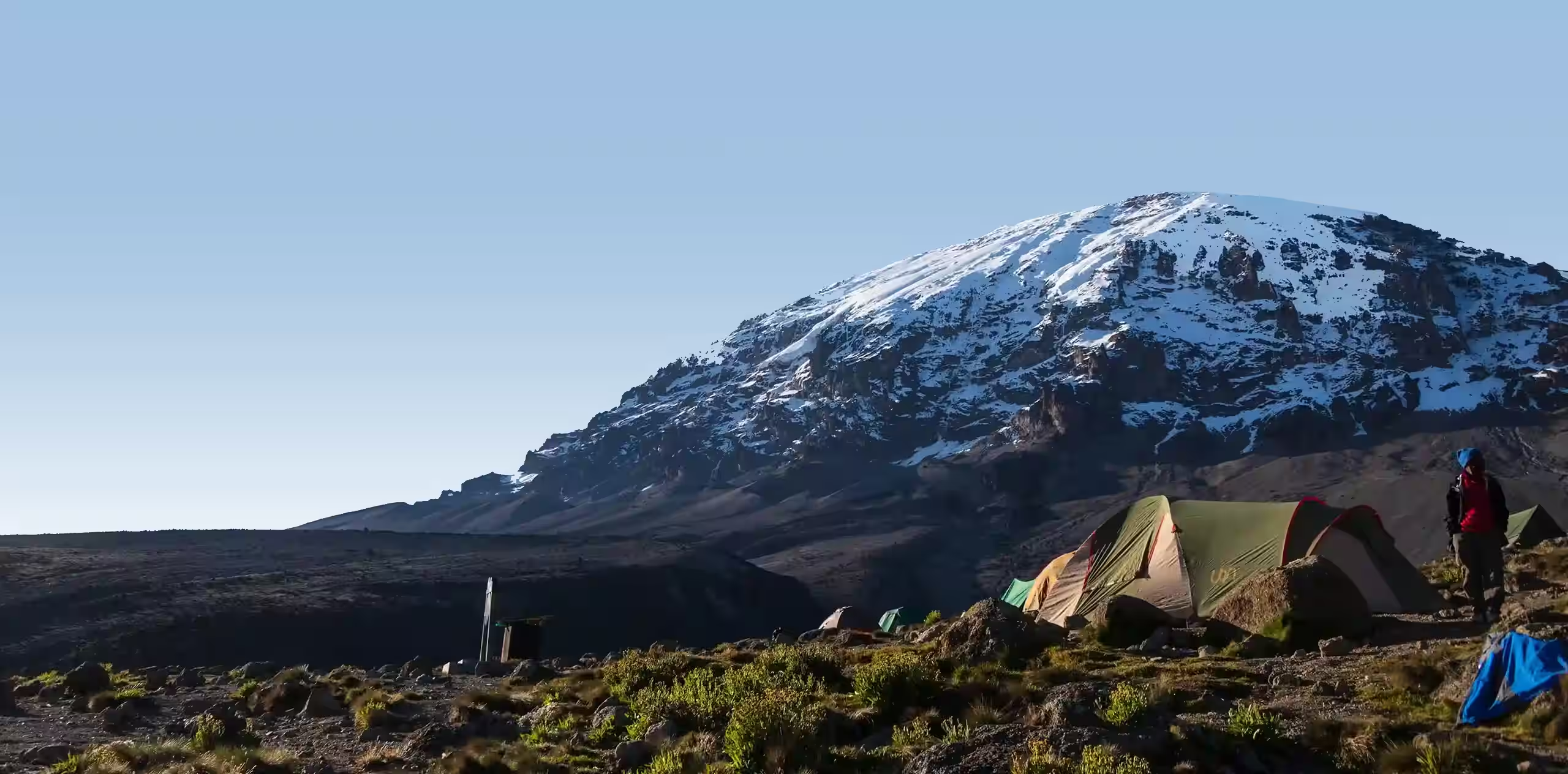

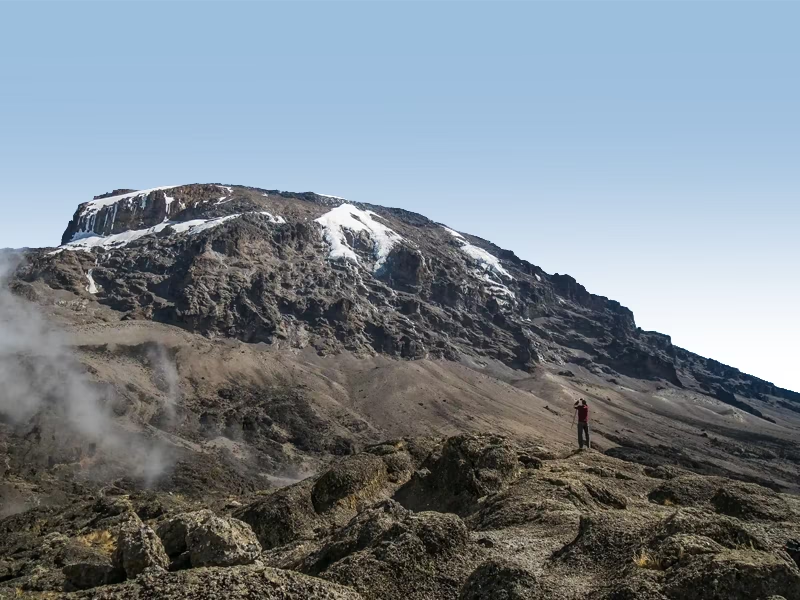
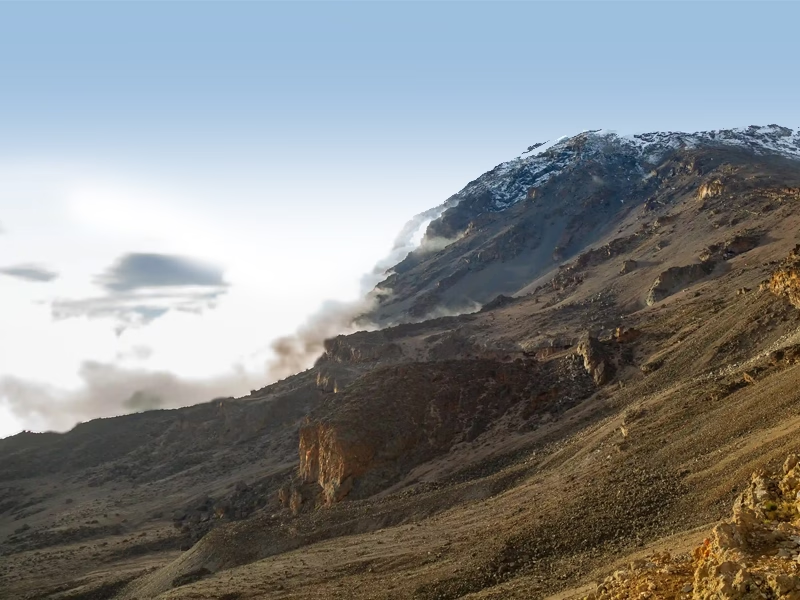
 Quest From The West
Quest From The West
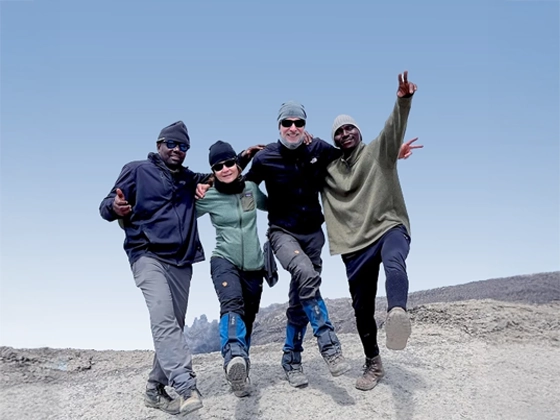
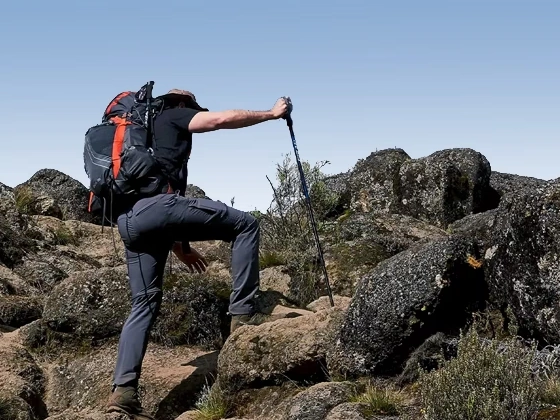
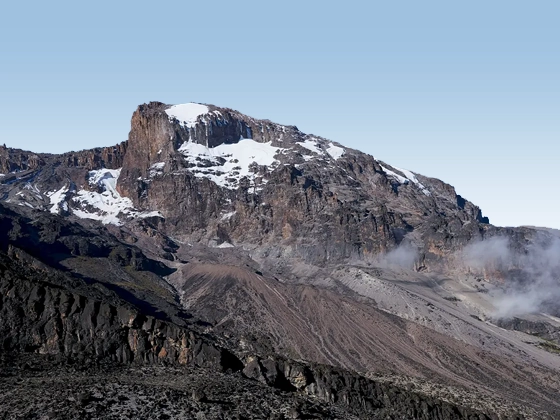
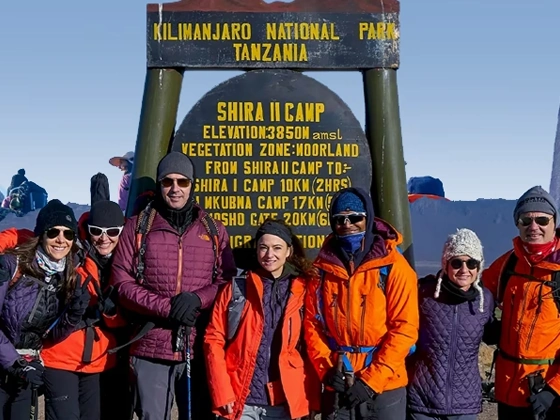
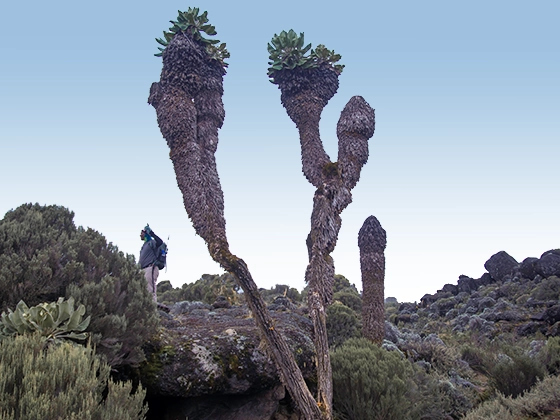
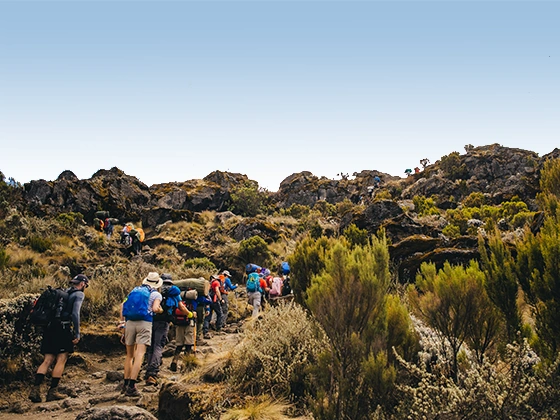




 African Scenic Safaris #1 on TripAdvisor
African Scenic Safaris #1 on TripAdvisor 




